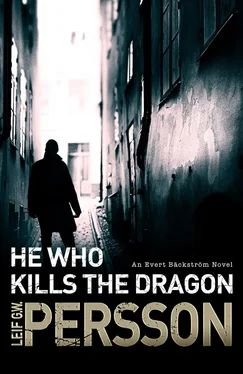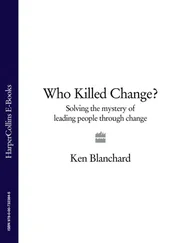Then he nodded and smiled a crooked smile.
His audience took this to be a dramatic pause, and that there was more to come. Bäckström merely shrugged again, nodded, and looked almost uninterested.
‘Well, that was it, really,’ Bäckström said.
His audience didn’t seem to share that view. There was a barrage of questions, and when the press secretary eventually restored some order, he invited the reporter from the largest television channel to speak.
‘What did you do then?’ she shouted, holding her microphone up even though Bäckström was sitting five meters away and had a microphone of his own attached to his lapel.
‘What could I do?’ Bäckström said. ‘One of them had a pistol and was trying to shoot me. The other one had a knife and was trying to stab me. So I was just trying to save my life.’
‘So what did you do?’ the national broadcaster’s reporter yelled, not prepared to be overlooked a second time.
‘I did as I’ve been trained,’ Bäckström said. ‘I disarmed the one with the pistol and rendered him harmless. The other one was trying to stab me, so I shot him in the leg. Below the knee,’ he added for some reason.
‘Hassan Talib,’ the reporter from Expressen panted. ‘One of the most feared heavies in the country, and a renowned assassin. He tried to shoot you and you say you disarmed him and rendered him harmless. According to information from the Karolinska Hospital, Talib has a fractured skull and is in intensive care, still in a critical condition.’
‘First I removed his weapon, seeing as he was trying to shoot me, then I brought him down with a judo move I learned when I was a boy. Unfortunately he hit his head on a table, and I’m very sorry about that.’
‘You disarmed him and brought him down—’
‘I think he has to take some of the blame for this,’ Bäckström interrupted. ‘What do you think I should have done? Give him a kiss and a big hug?’
No one in the room seemed to think so. There was cheering and applause and Bäckström was praised to the skies, and it could doubtless have carried on through the night if he hadn’t put a stop to it himself after just ten minutes.
‘Now, if you’ll excuse me,’ Bäckström said, standing up. ‘I’ve got a job to do. Among other things, I’ve got a double murder to sort out.’
‘One more question,’ pleaded the female reporter from TV3, and because she was better known for her blond hair and big breasts than her journalistic accomplishments, Bäckström had given her a half-Sipowicz and a benevolent nod.
‘Why do you think they were trying to kill you?’ she asked.
‘Maybe they were more afraid of me that some of my colleagues,’ Bäckström said with a shrug. Then he pulled off his microphone and walked out. When he passed his colleague Toivonen on the way out, he did so in a way that couldn’t escape anyone.
What’s good for Bäckström is good for the police, and that’s good for me, the county police chief thought, switching off the television. For the time being, she thought.
An unusually quiet hero who, unlike both Andy Sipowicz and Harry Callahan, belonged in the real world. In the absence of Bäckström himself, other people had to talk about him. The Aftonbladet newspaper had a large interview with his shooting instructor, which was practically lyrical.
‘The best pupil I ever had... one of the best shots in the police... ever... absolutely phenomenal... particularly under pressure... Absolutely ice-cold...’
Several of his fellow officers had spoken out, and the fact that most of them chose to do so anonymously was simply because Bäckström had always been ‘a highly controversial figure in the eyes of police management.’
There was complete unanimity and every comment was enthusiastic.
‘A legendary murder detective.’
‘He’s always right.’
‘He always sticks up for his fellow officers.’
‘Completely fearless, never backs down, never stands aside.’
‘Heads straight for his targets like a train.’
And so on, and so on.
Two of his fellow officers had appeared under their own names. First, his old friend and colleague, Detective Inspector Rogersson, himself a ‘legendary murder detective,’ who contented himself with saying that ‘Bäckström is a hell of a guy.’ And second, one of his former bosses, Lars Martin Johansson, now retired, and the man who fired him from National Crime.
‘What do I think about Evert Bäckström?’ Johansson said.
‘Yes, what do you think about him?’ DN ’s reporter repeated, even though he had done his homework on Johansson and Bäckström’s shared history.
‘Evert Bäckström is an absolute disaster,’ Johansson said.
‘Can I quote you on that?’
‘Absolutely,’ Johansson said. ‘As long as you don’t call this number again.’
For some reason Johansson’s comment didn’t appear in the paper.
When the press conference was over Holt had provided a simple lunch for those most closely involved. Bäckström had been thanked with a cut-glass vase on which his name had been engraved under the emblem of the Police Authority, as well as with an old-fashioned police badge that was supposed to have belonged to Viking Örn.
As soon as Bäckström got home he knocked on the door of his alcoholic neighbor, the former TV executive, and gave him the vase as a gift.
‘What the fuck do I want that for?’ his neighbor said, glowering at Bäckström suspiciously.
‘I thought maybe you could drown yourself in it, you fucking rat,’ Bäckström said. During his visit to the internal investigation team he had had the chance to listen to the recording of the call made to emergency control.
He had spent the rest of the evening reading all the letters and e-mails he had received, even replying to some of the most promising. He opened all the parcels and presents and had a few drinks in the process.
The best vodka in the world, Bäckström thought, holding up the little drinking glass that Nadja had put in the bag with the bottle. A lot of heart in that woman, he thought.
On Wednesday, a fortnight after the murder of Karl Danielsson, a fair amount had happened. Bäckström had gone from ‘police celebrity’ to ‘national celebrity.’
Stockholm Police’s biggest criminal investigation since the murder of Foreign Minister Anna Lindh had been reduced to ash and ruins, and even though it was the perpetrators who were responsible for the conflagration, Toivonen wasn’t inclined to laugh. He and his colleagues were left with the task of trying to mop up the mess, and it didn’t look like an easy job.
It was impossible to talk to Hassan Talib at all. His doctors merely shook their heads. Even if the patient survived, he wouldn’t be able to contribute much, even in the future. Extensive brain damage. Permanent damage.
‘Superintendent, you’re going to have to drop any hopes of that,’ the doctor said, nodding to Toivonen.
Farshad and Afsan Ibrahim could at least talk. The problem was that neither of them wanted to talk to the police.
Fredrik Åkare had already been questioned. He had been good-humored, had brought his usual lawyer, but had been completely uncomprehending. He and his friends were supposed to have murdered Nasir Ibrahim? A person that Åkare had never met, would never dream of meeting? And in Copenhagen? It must be at least a year since the last time he visited the Danish capital to see old friends and acquaintances.
‘Sometimes I almost worry about you, Toivonen,’ Åkare said with a smile. ‘You haven’t started drinking, have you?’
Peter Niemi had submitted a new forensic report, which, in any ordinary case, would have been a breakthrough in the investigation.
Читать дальше












